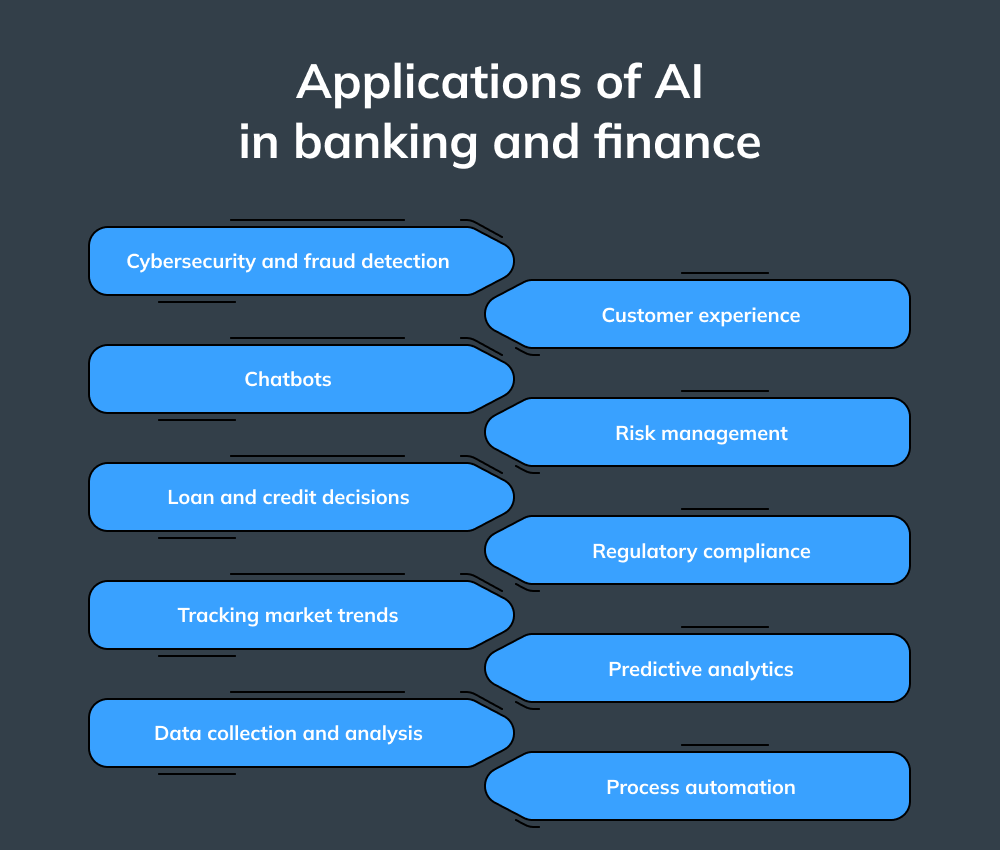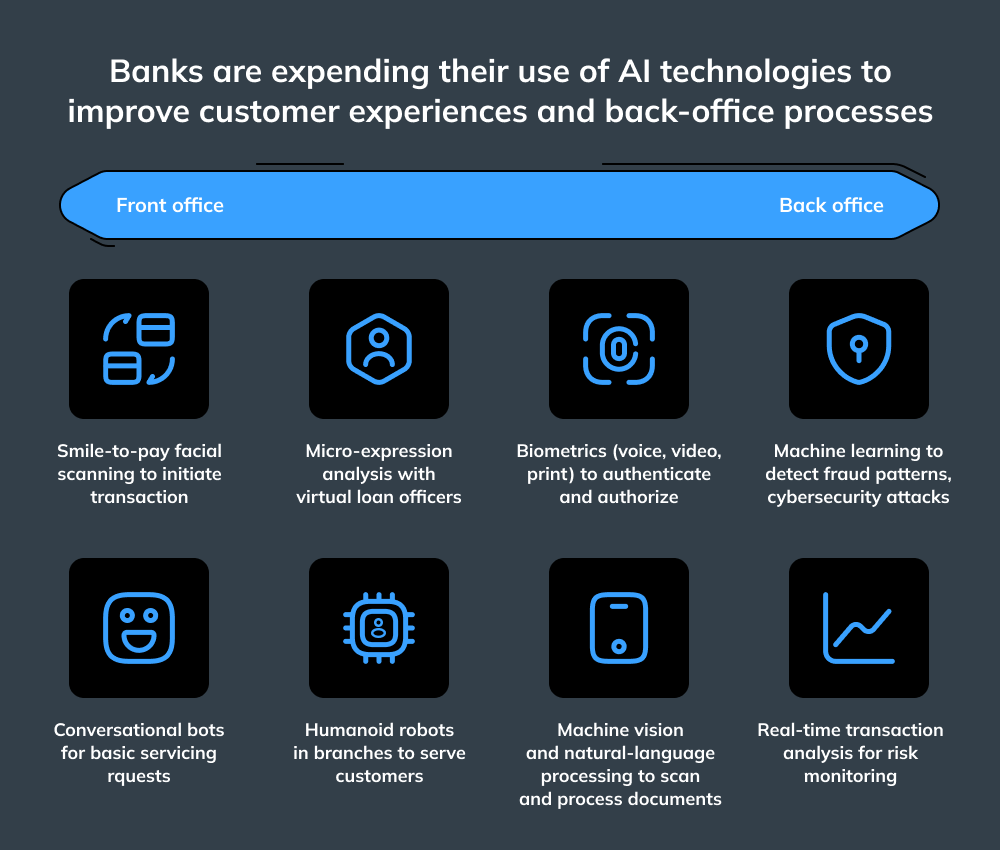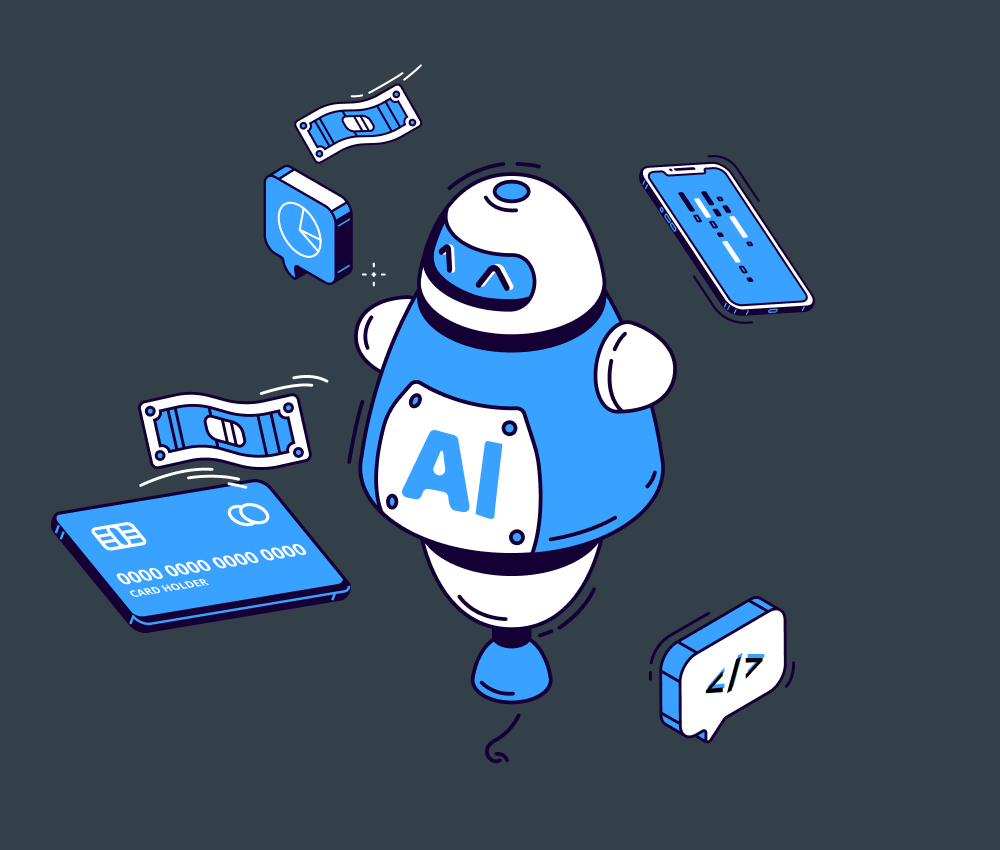Zastosowania sztucznej inteligencji w bankowości i finansach
Sztuczna inteligencja wplotła się w codzienną tkankę naszego życia - przekształcając branże w sposób, który jeszcze kilka lat temu mogliśmy sobie tylko wyobrazić. Zaprzeczanie jej znaczeniu byłoby krótkowzroczne: w szczególności sektor bankowości i finansów doświadczył ogromnych zmian dzięki innowacjom FinTech, przynosząc szereg korzyści zarówno interesariuszom, jak i klientom.
Cyberbezpieczeństwo i wykrywanie oszustw
Każdego dnia miliony transakcji przepływają przez system bankowy: ludzie płacą rachunki, wpłacają pieniądze, wypłacają środki, realizują czeki i nie tylko. Za kulisami banki nieustannie ścigają się, aby wyprzedzić cyberprzestępców - zwiększając swoje wysiłki w zakresie bezpieczeństwa, aby chronić operacje i aktywa oraz powstrzymywać nieuczciwe działania, zanim jeszcze będą miały szansę się wydarzyć.Sztuczna inteligencja jest teraz kluczowym graczem w tej grze o wysoką stawkę. Banki mogą wykorzystać potencjał sztucznej inteligencji do usprawnienia płatności cyfrowych, wykrywania luk w oprogramowaniu, identyfikowania podejrzanych zachowań klientów, jednocześnie zmniejszając ryzyko oszustw. Uczenie maszynowe - podzbiór sztucznej inteligencji - pomaga wykrywać i zapobiegać nielegalnym działaniom, takim jak phishing e-mailowy, oszustwa związane z kartami kredytowymi i telefonami komórkowymi, kradzież tożsamości i fałszywe roszczenia ubezpieczeniowe.Weźmy na przykład duński Danske Bank, który niedawno zaktualizował swoje przestarzałe oprogramowanie do wykrywania oszustw za pomocą nowoczesnych algorytmów sztucznej inteligencji. Dzięki zdolności ML do analizowania przeszłych transakcji (takich jak dane osobowe, dane, adres IP, lokalizacja itp.), bank odnotował 50% wzrost dokładności wykrywania oszustw i 60% zmniejszenie liczby fałszywych alarmów. Ponieważ banki są głównymi celami hakerów, powszechne stosowanie uczenia maszynowego i sztucznej inteligencji ma kluczowe znaczenie. Technologie te pomagają organizacjom finansowym szybko reagować na zagrożenia cyfrowe, wzmacniając ich obronę przed cyberatakami, zanim zagrożą one systemom wewnętrznym, pracownikom lub klientom.Chatboty
Wykorzystanie chatbotów w bankowości jest jednym z prostszych przykładów wdrożenia sztucznej inteligencji. Po wdrożeniu będą one dostępne przez całą dobę, w przeciwieństwie do ludzkich pracowników z ustalonymi harmonogramami i potrzebą regularnych przerw. Chatboty nie tylko udzielają uniwersalnych odpowiedzi na zapytania: uczą się na podstawie interakcji z klientami, gromadząc wiedzę, która pozwala im przewidywać potrzeby użytkowników i odpowiednio dostosowywać swoje odpowiedzi. Integrując chatboty oparte na sztucznej inteligencji z aplikacjami bankowymi, menedżerowie mogą mieć pewność, że ich klienci otrzymują spersonalizowaną obsługę klienta 24 godziny na dobę, 7 dni w tygodniu, z produktami i usługami dostosowanymi do indywidualnych potrzeb.Przykładem udanego chatbota może być Erica: wirtualny asystent oparty na sztucznej inteligencji z Bank of America. Od 2019 roku Erica obsłużyła ponad 50 milionów zapytań klientów - od pomocy klientom w zmniejszeniu zadłużenia na karcie kredytowej po aktualizację zabezpieczeń karty.Decyzje dotyczące pożyczek i kredytów
Banki korzystają obecnie z szerokiej gamy inteligentnych narzędzi, aby poprawić dokładność, precyzję i rentowność swoich decyzji kredytowych i pożyczkowych. Konwencjonalne oprogramowanie bankowe często nie spełnia swoich zadań, nękane błędami, nieścisłościami w historii transakcji i błędną klasyfikacją wierzycieli. Organizacje finansowe muszą ściśle monitorować historie kredytowe i referencje klientów przy udzielaniu kredytów i ocenie wypłacalności osób fizycznych lub firm. Systemy oparte na sztucznej inteligencji analizują wzorce zachowań klientów, aby podejmować oparte na danych decyzje dotyczące zdolności kredytowej, niezwłocznie ostrzegając banki o wszelkich podejrzanych lub ryzykownych działaniach.Doświadczenie klienta
Klienci oczekują intuicyjnego i łatwego w obsłudze korzystania z aplikacji bankowych. Minęły już czasy, gdy odwiedzanie oddziału banku było konieczne do prostych transakcji, takich jak wpłaty i wypłaty, dzięki wygodzie bankomatów.W dzisiejszych czasach - przy bardziej obeznanej z technologią populacji - banki muszą stale wprowadzać innowacje, aby zapewnić szybkie i bezpieczne rozwiązania w zakresie płatności cyfrowych. Sztuczna inteligencja pomaga skrócić czas potrzebny na zarejestrowanie informacji KYC i wyeliminowanie błędów, usprawnia szybkie wprowadzanie produktów na rynek i proaktywnie rozwiązuje problemy przed ich uruchomieniem.Gdyby tego było mało, ubieganie się o pożyczkę osobistą nigdy nie było łatwiejsze. Klienci nie muszą już męczyć się z ręcznym wypełnianiem wniosków: AI i ML w FinTech skracają czas zatwierdzania, przechwytując precyzyjne i wolne od błędów dane dotyczące kont klientów.Zarządzanie ryzykiem
Wahania kursów walut, wstrząsy polityczne, klęski żywiołowe i konflikty zbrojne mogą wywołać fale uderzeniowe w systemach finansowych i bankowych. W burzliwych czasach podejmowanie mądrych decyzji inwestycyjnych ma kluczowe znaczenie dla utrzymania się na powierzchni i uniknięcia strat finansowych. W tym miejscu do gry wkracza sztuczna inteligencja - zapewniając przydatny przegląd bieżących wydarzeń, prognozując przyszłe trendy i przewidując, co nas czeka, sztuczna inteligencja pomaga inwestorom pewnie poruszać się po niepewnych wodach. Sztuczna inteligencja może również pomóc w ustaleniu, czy klient będzie w stanie spłacić pożyczkę, analizując wzorce zachowań, historię kredytową i dostępne dane osobowe.Zgodność z przepisami prawnymi
FinTech wyróżnia się jako jeden z najsilniej regulowanych sektorów w globalnej gospodarce. Rządy odgrywają dużą rolę jako główni strażnicy - monitorując i nadzorując banki w celu zapobiegania przestępstwom finansowym, praniu pieniędzy i uchylaniu się od płacenia podatków.Wymogi prawne i standardy często się zmieniają - co oznacza, że banki muszą utrzymywać dobrze poinformowane, sprawne działy zajmujące się badaniem i wdrażaniem stale zmieniających się przepisów finansowych. Proces ten, wykonywany ręcznie, jest zarówno czasochłonny, jak i kosztowny. Wykorzystując moc głębokiego uczenia i NLP, systemy AI mogą szybko analizować nowe przepisy i oceniać wymagania dotyczące zgodności, upewniając się, że organizacje spełniają wszystkie zewnętrzne przepisy, a także wewnętrzne zasady. Chociaż sztuczna inteligencja nie zastąpi wykwalifikowanego analityka ds. zgodności, może wskazać krytyczne lub niejednoznaczne aspekty przepisów i zabezpieczyć firmę przed ryzykiem legislacyjnym.Analityka predykcyjna
Wykorzystanie sztucznej inteligencji do analityki predykcyjnej jest trochę jak posiadanie wysoce intuicyjnego asystenta, który może wskazać trendy i korelacje, które ludzie lub konwencjonalne technologie często przeoczają. Sztuczna inteligencja jest szeroko stosowana w analizie języka naturalnego i semantyce ogólnego przeznaczenia, dzięki jej zdolności do szybkiego wykrywania określonych wzorców i korelacji danych. Jest to przełom dla sektora bankowego: analizy predykcyjne pomagają instytucjom finansowym zdefiniować niewykorzystane możliwości sprzedaży, dostarczać wskaźniki oparte na danych i ujawniać specyficzne dla branży spostrzeżenia, które mogą znacznie zwiększyć przychody.Dlaczego sektor bankowy powinien korzystać ze sztucznej inteligencji?
Świat bankowości szybko zmienia się w kierunku modeli skoncentrowanych na kliencie, które mają na celu zaspokojenie potrzeb i oczekiwań każdego klienta. Dzisiejsi klienci chcą, aby ich banki były dostępne 24 godziny na dobę, 7 dni w tygodniu, oferując innowacyjne narzędzia i funkcje, które sprawiają, że korzystanie z bankowości jest bezproblemowe. Aby sprostać tym oczekiwaniom, banki muszą najpierw stawić czoła wewnętrznym wyzwaniom, takim jak starsze systemy oprogramowania, rozdrobnione silosy danych, ograniczone budżety i niska jakość aktywów. Gdy te przeszkody zostaną ominięte, banki będą o krok bliżej do wykorzystania sztucznej inteligencji do rozwiązywania codziennych problemów.Sztuczna inteligencja nie tylko zapewnia niezrównane cyberbezpieczeństwo, ale także sprawia, że usługi finansowe są wygodniejsze i oszczędzają czas zarówno klientów, jak i pracowników.
Wyzwania związane z szerszym zastosowaniem sztucznej inteligencji w finansach i bankowości
Nie ulega wątpliwości, że sztuczna inteligencja niesie ze sobą pakiet niezliczonych korzyści - ale jej powszechne przyjęcie utrudniają różne kwestie, takie jak luki w wiarygodności i zagrożenia dla bezpieczeństwa. Holistyczna strategia i kompleksowe podejście do sztucznej inteligencji i uczenia maszynowego w finansach może znacznie zmniejszyć te zagrożenia, zwiększając prawdopodobieństwo sukcesu i związanych z nim zysków finansowych. Decydenci poruszający się po ekscytującym świecie sztucznej inteligencji w finansach mogą napotkać szereg typowych przeszkód, które przedstawiono poniżej.
Bezpieczeństwo danych
Sztuczna inteligencja gromadzi, przechowuje i obsługuje ogromne ilości wrażliwych danych osobowych - co oznacza, że instytucje finansowe muszą ustanowić środki ochrony, aby zapobiec naruszeniom danych i nieautoryzowanemu dostępowi. Banki powinny priorytetowo traktować żelazne systemy ochrony danych podczas obsługi dużych ilości informacji związanych ze sztuczną inteligencją, aby wyeliminować wszelkie zagrożenia i zapewnić bezpieczeństwo poufnych informacji.Brak danych wysokiej jakości
Niewystarczająca jakość danych stanowi duże wyzwanie dla firm z branży FinTech. Bez dobrze zorganizowanych danych zastosowanie spostrzeżeń w rzeczywistych sytuacjach jest prawie niemożliwe, jeśli nie odpowiadają one aktualnym realiom. Ponadto dane, które różnią się od formatu nadającego się do odczytu maszynowego, mogą prowadzić do nieprzewidywalnych zachowań w modelach sztucznej inteligencji. Banki, które chcą wdrożyć sztuczną inteligencję, powinny zmodyfikować - a w razie potrzeby zmienić - swoje zasady dotyczące danych i wprowadzić większy porządek w przepływach danych.Kwestie wytłumaczalności
Ponieważ oprogramowanie oparte na sztucznej inteligencji eliminuje błędy i oszczędza czas, jest szeroko stosowane w procedurach decyzyjnych. Niestety, mogą one mieć uprzedzenia wynikające z wcześniejszych błędów ludzkich osądów. Może to oznaczać, że reputacja banku może być zagrożona, jeśli drobne rozbieżności w sztucznej inteligencji eskalują i powodują problemy na dużą skalę. Wszystkie dane zaangażowane w scenariusze AI powinny być jasne i przejrzyste, nie pozostawiając miejsca na potencjalne rozbieżności.Jak Innowise może przyspieszyć Twoją przygodę ze sztuczną inteligencją?


















